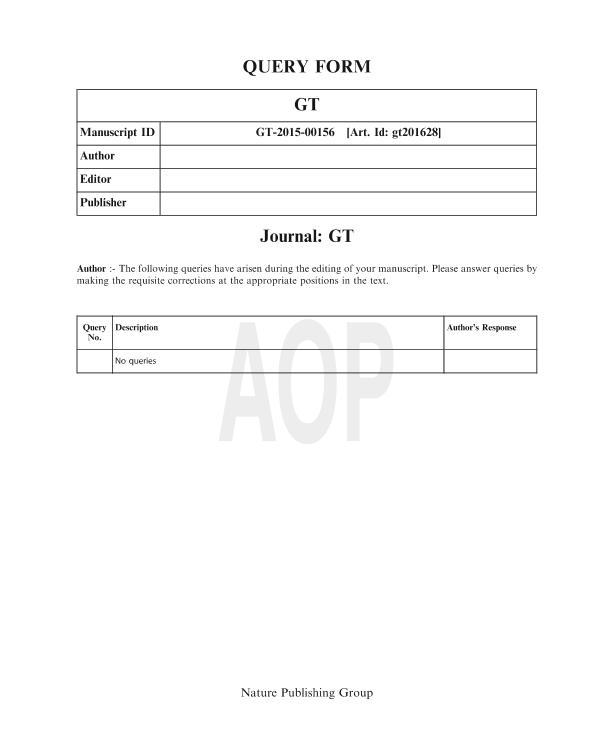Mostrar el registro sencillo del ítem
dc.contributor.author
Giménez, Carla Alejandra

dc.contributor.author
Ielpi, Marcelo

dc.contributor.author
Mutto, Adrián Angel

dc.contributor.author
Grosembacher, Luis
dc.contributor.author
Argibay, Pablo

dc.contributor.author
Pereyra Bonnet, Federico Alberto

dc.date.available
2018-05-03T19:30:07Z
dc.date.issued
2016-04
dc.identifier.citation
Giménez, Carla Alejandra; Ielpi, Marcelo; Mutto, Adrián Angel; Grosembacher, Luis; Argibay, Pablo; et al.; CRISPR-on system for the activation of the endogenous human INS gene; Nature Publishing Group; Gene Therapy; 23; 4-2016; 543–547
dc.identifier.issn
0969-7128
dc.identifier.uri
http://hdl.handle.net/11336/44026
dc.description.abstract
Advances in the field of epigenetics have allowed the design of new therapeutic strategies to address complex diseases such as type 1 diabetes (T1D). Clustered regularly interspaced short palindromic repeats (CRISPR)-on is a novel and powerful RNA-guided transcriptional activator system that can turn on specific gene expression; however, it remains unclear whether this system can be widely used or whether its use will be restricted depending on cell types, methylation promoter statuses or the capacity to modulate chromatin state. Our results revealed that the CRISPR-on system fused with transcriptional activators (dCas9-VP160) activated endogenous human INS, which is a silenced gene with a fully methylated promoter. Similarly, we observed a synergistic effect on gene activation when multiple single guide RNAs were used, and the transcriptional activation was maintained until day 21. Regarding the epigenetic profile, the targeted promoter gene did not exhibit alteration in its methylation status but rather exhibited altered levels of H3K9ac following treatment. Importantly, we showed that dCas9-VP160 acts on patients' cells in vitro, particularly the fibroblasts of patients with T1D.
dc.format
application/pdf
dc.language.iso
eng
dc.publisher
Nature Publishing Group

dc.rights
info:eu-repo/semantics/openAccess
dc.rights.uri
https://creativecommons.org/licenses/by-nc-sa/2.5/ar/
dc.subject
Crisprs
dc.subject
Rna
dc.subject
Esc
dc.subject
Insulin
dc.subject.classification
Otras Ciencias Biológicas

dc.subject.classification
Ciencias Biológicas

dc.subject.classification
CIENCIAS NATURALES Y EXACTAS

dc.title
CRISPR-on system for the activation of the endogenous human INS gene
dc.type
info:eu-repo/semantics/article
dc.type
info:ar-repo/semantics/artículo
dc.type
info:eu-repo/semantics/publishedVersion
dc.date.updated
2018-05-03T13:59:27Z
dc.journal.volume
23
dc.journal.pagination
543–547
dc.journal.pais
Reino Unido

dc.journal.ciudad
Londres
dc.description.fil
Fil: Giménez, Carla Alejandra. Hospital Italiano; Argentina. Consejo Nacional de Investigaciones Científicas y Técnicas; Argentina
dc.description.fil
Fil: Ielpi, Marcelo. Hospital Italiano; Argentina
dc.description.fil
Fil: Mutto, Adrián Angel. Consejo Nacional de Investigaciones Científicas y Técnicas. Centro Científico Tecnológico Conicet - La Plata. Instituto de Investigaciones Biotecnológicas. Universidad Nacional de San Martín. Instituto de Investigaciones Biotecnológicas; Argentina
dc.description.fil
Fil: Grosembacher, Luis. Hospital Italiano; Argentina
dc.description.fil
Fil: Argibay, Pablo. Hospital Italiano; Argentina. Consejo Nacional de Investigaciones Científicas y Técnicas; Argentina
dc.description.fil
Fil: Pereyra Bonnet, Federico Alberto. Hospital Italiano; Argentina. Consejo Nacional de Investigaciones Científicas y Técnicas; Argentina
dc.journal.title
Gene Therapy

dc.relation.alternativeid
info:eu-repo/semantics/altIdentifier/doi/http://dx.doi.org/10.1038/gt.2016.28
dc.relation.alternativeid
info:eu-repo/semantics/altIdentifier/url/https://www.nature.com/articles/gt201628
Archivos asociados
